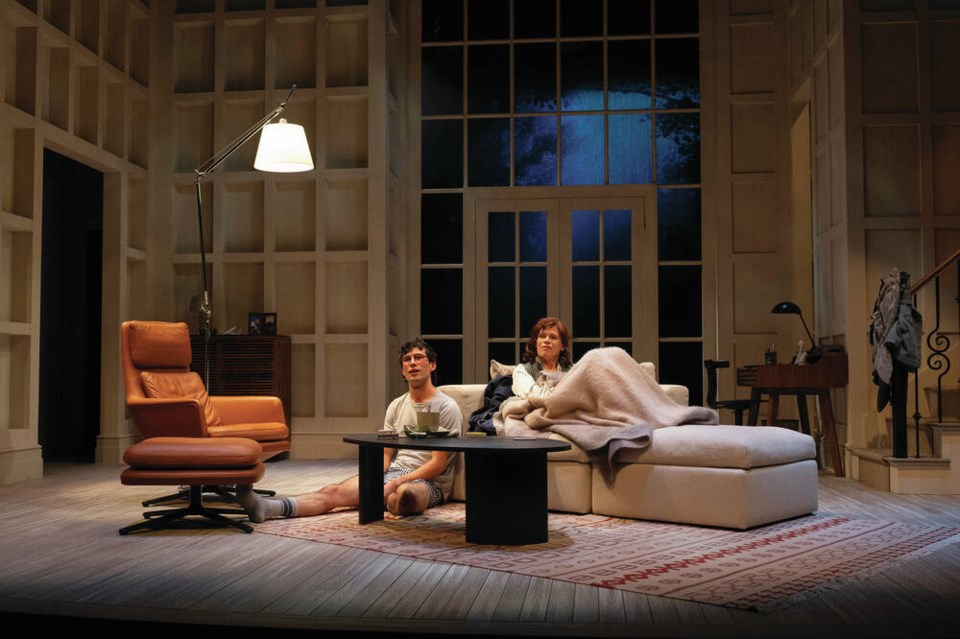FROM ALASKA
Where: The Belfry Theatre, 1291 Gladstone Ave., Victoria
When: Sept. 19–Oct. 13
Tickets: Pay What You Can from The Belfry Theatre box office (250-385-6815) or tickets.belfry.bc.ca
“It takes two to make a thing go right,” rapper Rob Base once wrote. “It takes two to make it out of sight.”
Therein lies the foundation of a two-hander, a play with just two characters. While myriad factors play into their dynamic, a two-hander succeeds or fails based on the interplay between the two leads. It requires a sizable effort by both parties involved, but the results can be inspiring when done right.
Acting in a two-hander can be quite difficult, however. With only one actor with whom to play off, the skill involved is considerable, which makes the writing increasingly important. “You are really dependent on the other person,” said Brenda Robins, who stars in From Alaska, the two-hander which opens The Belfry Theatre’s season tonight. “But in this play, it’s scary because I have a lot of long monologues. That is tricky because I’ve got nobody to save me if something goes awry.”
Robins, who is from Toronto, plays a heartbroken senior in the play by Québécois playwright Sébastien Harrisson, while Ottawa-based Kosta Lemermeyer plays her fast-talking teenaged neighbour. From Alaska, which runs through Oct. 13, will have its English-language premiere at The Belfry Theatre, with direction by artistic director Michael Shamata.
There’s a sense of wonder to the play, Robins said, which is often conveyed through the pre-arranged work of set/costume designer Christina Poddubiuk and lighting designer Leigh Ann Vardy, and projection designer Keith Houghton. “There’s some really beautiful technical elements in this play that lend so much to the magical realism of the piece. That adds this incredible dimension that is going to really help tell the story. The language is accompanied by these great visuals.”
The story was written in French, and was nominated for the Governor General’s Award for Drama following its 202o premiere. It has never been performed in English, which lent a degree of unpredictability to rehearsals. Everyone involved rose to the challenge, Robins said, including Harrisson and translator Leanna Brodie.
“I really love working on new plays. As we’ve gone through it, we’ve changed some things, obviously with the permission of the writer and translator. Performers and what they are bringing to it, that will evolve as the rehearsals go on. It’s a different way of working when you’re tackling something new. It feels like you have some ownership over what you’re saying and doing.”
The Shaw Festival and Stratford Festival veteran would know: In 2009, Robins and playwright Adam Pettle adapted Parfumerie, a 1937 play by Hungarian playwright Miklós László, for Toronto’s Soulpepper Theatre Company. Oscar winner Nora Ephron adapted the same source material for her 1998 film, You’ve Got Mail, one of three film adaptations of Parfumerie to date (the others are 1940’s The Shop Around the Corner and 1949’s In the Good Old Summertime.)
Robins did not add her input during rehearsals for From Alaska without careful consideration, knowing first-hand what it’s like for a playwright to have actors make additional changes. “I had a good friend who was a writer, and having never done anything like it before, he would say to me, ‘Okay, you take scenes 5, 7 and 9,’ and I wouldn’t even know what he was talking about. But it was great. It was really fun, really collaborative. It was a good learning experience for me.”
She has since adapted several plays, including 2017’s Picture This, which she adapted with Morris Panych. Now, with experience both as a writer and actor, she has a grasp of the “musicality” of scripts, she said.
“I feel like I can hear in my head when a line needs and extra bump, or whether it needs to shortened. I can hear the music of it. I’m not sure if it’s because of writing, but [as an actor] I’ve been able to exercise that part of my brain.”



